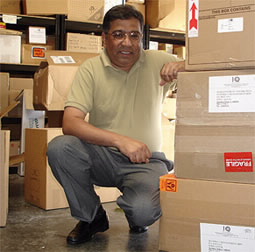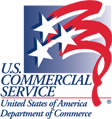

JQ American - Finding Market Value with the “Made in America” Label
With his first sale of medical equipment many years ago, Jamal Qureshi turned the dream of starting his own business into a long-term reality. Now, as chief executive officer of JQ American in Hayward, California, Qureshi is tapping the lucrative world market as an exporter of products and services in the energy, medical, pharmaceutical, and chemical industries. Qureshi, who immigrated to the United States years ago, recently came full circle and has just started doing business in the city where he was born.
About a year ago, while attending a high school reunion in his native city of Bhopal, India, Qureshi learned that the Bhopal Medical College Trust wanted to outfit its soon-to-be-built medical training hospital with equipment using some of the latest U.S. medical technologies. For Qureshi, helping the citizens of his old hometown would turn into the opportunity of a lifetime.
Selling internationally wasn’t new to Qureshi. He already had a solid record of export successes. He sold to 16 countries—including a contract with the United Nations in Kosovo to outfit a hospital with medical supplies and sales of medical and laboratory equipment to Iraq and its Ministry of Health. JQ American is unusual because most U.S. small and medium-size firms that export do so to only one international market.

Jamal Qureshi, CEO of JQ American
The Challenge
Looking at India, Qureshi knew that financing was key to making the deal happen. India, like many countries, does not have a tradition of credit cards or other forms of advance payment. Purchasers want terms—often 45 days—and sellers from competitor countries are ready to grant them. Qureshi, however, does not usually have a cash flow sufficient to meet the buyers’ demand for expensive imaging and other devices. Would the schmoozing with high school pals and the chance to do some good (and some good business) in his old stomping grounds come to naught?
The Solution
Over several months, Qureshi, with help from the U.S. Commercial Service in Oakland, California, arranged key meetings through videoconference and phone calls with the Bank of Alameda (California), the U.S. Export–Import (Exim) Bank, the State Bank of India, and the Bhopal Medical College Trust. These efforts enabled Qureshi to obtain an Exim Bank letter of interest and qualify for a subsequent commercial financing loan of $23 million through the Bank of Alameda and State Bank of India. Impressed with JQ American’s reputation and its ability to meet the financial requirements of the project, Bhopal Medical College Trust considered JQ American its top choice for the supplier contract. After months of negotiation, Qureshi finalized the deal during a U.S. Commerce Department trade mission to India.
Lessons Learned
Qureshi is aware that he personifies the American Dream, so much so that he made American part of his company name. Given that the markets JQ American works in often proclaim opposition to U.S. foreign policy and values in the form of consumer boycotts and worse, some people might consider the company’s name the kiss of commercial death.
Qureshi doesn’t buy it. “People around the world love our products and services,” he says, directing a doubtful graphic designer to add more American flags to his new logo. “Even with embargoes, they want us. Iranians will shout, ‘Down with America,’ then buy our stuff through third parties.”
Why do American companies have such an advantage? “Because we are world leaders in so many areas, but especially in setting high quality standards,” Qureshi says. “In other countries, including China, quality varies from region to area and from company to company. My customers will pay more for the ‘Made in America’ label.”
Qureshi’s upbringing in a hardscrabble part of India gave him a certain comfort level for doing business in challenging parts of the world, but he says that the requisite skills can be learned by doing. “Get out in the world and get a feel for what people want and how they do business,” he advises. “The opportunities for growth are tremendous, and the risks are very manageable, thanks to advances in logistics, banking, and market intelligence for the smaller U.S. company.”
One lesson he learned in Kosovo and the Middle East is that it’s important to have reliable locals perform after-sales service. In a new project in the Philippines, where he’s equipping a medical tourism hospital, Qureshi plans to hire and train Filipinos to provide 24/7 maintenance for surgical and other sophisticated devices. “Hospitals are complex places that reflect local cultures,” he explains. “By offering a turnkey solution with local maintenance, I was able to make a very favorable impression.”
The U.S. Commercial Service has helped Qureshi find local equipment maintenance companies in markets around the world. Commercial Service specialists find and vet candidates and help Qureshi make the selection.
Working with U.S. government personnel has other advantages. Qureshi explains, “Showing up at a potential buyer’s with U.S. officials in tow always makes a positive impression—so positive that I now conduct at least one business meeting with potential buyers who visit me in the U.S. at my local federal building.
The Commercial Service helped Qureshi line up financing and facilitate other deals in India during a recent trade mission there. Thanks to U.S. government resources such as Exim Bank, JQ American has lines of credit to finance new export sales and can get additional funds in turnaround times of five days or less.
Access to credit and government expertise transformed JQ American from a cautious international dabbler to a confident, successful global player in the international health care equipment industry. By improving the lives of others through U.S. technology and innovation, Qureshi met a lifetime goal to make a positive a difference in the world. “When it comes to creating trusting, enduring relationships—business is more effective than politics or diplomacy,” he says.
This success story is also featured in our publication A Basic Guide to Exporting: The Official Government Resource for Small and Medium-Sized Businesses. To purchase this book, please visit the U.S. Government Bookstore.
|
The U. S. Commercial Service is a U. S. Department of Commerce agency that helps small-and medium-sized U. S. businesses sell their products and services globally. With its network of offices across the United States and in more than 80 countries, the U.S. Commercial Service of the U.S. Department of Commerce's International Trade Administration utilizes its global presence and international marketing expertise to help U.S. companies sell their products and services worldwide. For more information, visit www.export.gov. |
